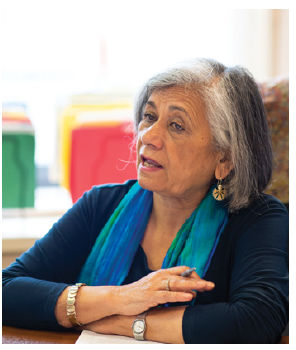The Refugee Crisis: ‘[We should] Stabilize The Hotspots Do People Can Go Back To Their Homes’

Diplomat magazine: According to the World Refugee Council report we’re discussing today, half of the population of Syria has fled. What will become of that country?
Ratna Omidvar: It’s a very big geopolitical question. I don’t know what will happen. When I left Iran in 1980, I remember thinking that the regime change had to be coming and yet, there’s still no sign of it. In Syria, with so many [people] having been displaced and so many of them internally displaced with very little access to resources that could have been available if they’d managed to leave the country, [it’s hard to say.] I deal with what’s happening in the present.
The World Refugee Council report is a very comprehensive one and the reason it’s important is because it doesn’t present an institutional point of view of external stakeholders. It’s pretty substantive. Many of the recommendations are focused on multilateral institutions, such as the United Nations or the World Bank. But then there are a number that are in the hands of nation-states.
DM: And that brings us to the Bill S-259 — Frozen Asset Repurposing Act — you introduced in the Senate.
RO: Yes. My bill deals with a nation’s capacity to seize the assets of corrupt former officials that are located in the country and to redeploy them so the displacement that has been created by these corrupt people can be addressed and ameliorated to some extent. I tabled this bill in the Senate [in March.]
I have aspirations that Canada will embrace this idea, but I also have aspirations that if Canada embraces it, others will follow, just as Canada has followed the movement of the Magnitsky [Act, which targets the assets of corrupt officials who have committed grievous human rights violations and] which was called into law in the U.S., the U.K., Canada and Estonia. I think there’s an interest in nation-states learning from each other in how to deal with these crises of corruption and displacement because they are linked, one to the other. This is an idea whose time may well have come.
My bill is in second reading in the Senate. [Peter Beam], a former deputy minister of Global Affairs who is now a senator, weighed in last week and was very positive about what the bill is intending to do and about the approach in implementation that the bill takes. I know there are similar pieces of legislation that are being reviewed in the U.K. and France. I think the time has come to put this on the agenda. I fully intend to pick up this bill as soon as the next Parliament is convened. Peter Beam was an ambassador so he understands the global context of diplomacy in all of this.
DM: What are the other hotspots you anticipate in this context?
RO: I anticipate that Bangladesh will continue to be a hotspot because the situation in Myanmar doesn’t seem to be easily resolvable. Bangladesh is incredibly pressured with the arrival of close to a million refugees and is [buckling] under the pressure. As a result, since the world is unable to resolve the situation, they’re [Bangladesh] actually considering repatriating the refugees back to Myanmar under the very same conditions [they left] with no guarantees for their security. I imagine that hotspot will dominate the discourse for another couple of years at least.
The situation in Syria — I can’t read the tea leaves, but if I were outside Syria as a refugee, I don’t know whether I would consider going back at this point. Because ultimately, if the situations resolve themselves, then people go back. Let’s consider the history of the movement from Bosnia and Serbia in the 1990s. Canada received a number of refugees — I think it was 3,000 to 4,000. As soon as the situation stabilized with the help of the multinationals, many of the refugees left. They chose to go back and lead their lives again.
Ideally, those are the conditions the world should try to create. Stabilize the hotspots so people can go back to their homes, their language, their family, their culture and pick up the threads of their lives again. The intention of the world on resettlement, which involves about 10 per cent of the world’s refugee population, is important, but misplaced. What is more important is resolving the situations in these unstable countries. That is long-term and painful and it requires dedication and effort that is hard to sustain. We need to look at out-of-the-box solutions. The report the World Refugee Council has tabled includes a number of practical solutions that are catalytic and transformational. The bill I’m proposing is practical because it’s in the hands of one nation-state. Multilateral solutions typically are, as you well know, three steps forward, two steps back.
I do like the idea of calling into play the world’s multilateral solutions around this question of safety and security for refugees. Of course, the UNHCR [United Nations High Commissioner for Refugees] will always be the primary multilateral institution, but there’s the World Bank, the International Monetary Fund, the World Trade Organization, too. When you think about all the levers that are in play and if these institutions got together and worked together as opposed to working in isolation, we could actually make some significant headway.
Click here to read the full interview on Diplomat Magazine’s website.